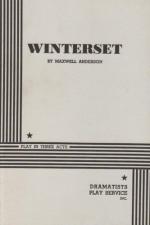|
This section contains 1,759 words (approx. 5 pages at 400 words per page) |

|
Trudell is a freelance writer with a bachelor's degree in English literature. In the following essay, Trudell discusses the techniques Anderson uses to develop and test the philosophical assertions of his tragedy.
Profound and thematically ambitious, with commentaries on the nature of truth, existence, religion, love, death, and many other fundamental values and ideas, Winterset is a philosophical play. Anderson does not merely imitate Shakespeare in style; he follows the famous playwright's tendency to present and examine a number of philosophies and traditions that are represented and expressed by various characters. For example, Mio's contemplative speeches have roots in Senecan (based on Seneca, the ancient Roman writer of revenge tragedies) and Shakespearean philosophical traditions. Also, Esdras's wise commentaries owe much to Judaic lore and the biblical book of Job. As Robert L. Gilbert points out in his essay, "Mio Romagna: A New View of Maxwell Anderson's Winterset...
|
This section contains 1,759 words (approx. 5 pages at 400 words per page) |

|




